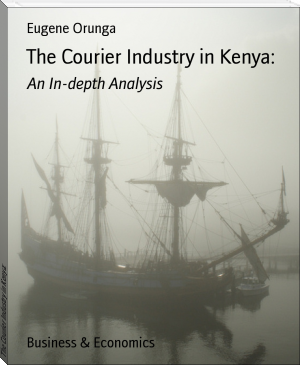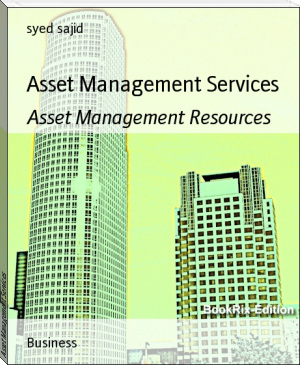The Courier Industry in Kenya: by Eugene Orunga (self help books to read TXT) 📕

The industry has grown to attract international firms operating together with local courier companies, security firms and bus service companies as they deliver items around the country.
The level of use of technology has relatively been low, but with the development of systems such as D-Trail to help in parcel management, parcel tracking, employees and rider/driver management, has greatly has an impact in the industry with most courier companies signing up to use the software.
Read free book «The Courier Industry in Kenya: by Eugene Orunga (self help books to read TXT) 📕» - read online or download for free at americanlibrarybooks.com
- Author: Eugene Orunga
Read book online «The Courier Industry in Kenya: by Eugene Orunga (self help books to read TXT) 📕». Author - Eugene Orunga
TNT
TNT Express N.V. is an international courier delivery services company with headquarters in Hoofddorp, Netherlands. The firm has fully owned operations in 63 countries and delivers documents, parcels and pieces of freight to over 200 countries. The name TNT is short for Thomas Nationwide Transport, after Ken Thomas, an Australian businessman who, in 1946, set up his own transport business with just a single truck.
Aramex
Aramex is a global transportation and logistics services company providing a variety of express, logistics, freight forwarding and domestic distribution services. The company was established in 1982 and is headquartered in Amman, Jordan.
Local Courier Companies
The industry also has various local and regional companies that offer both mail and parcel delivery. Some of these companies operate within different cities in the country while others have larger networks and extend their services to other parts of the country, and some go beyond borders to operate within the East African region.
Major cities such as Nairobi, Mombasa and Kisumu have experienced changing lifestyles that have necessitated the growth and expansion of delivery services and online businesses. People in this cities are becoming more and more engaged in their daily economic activities and do not find enough time to do their own shopping and errands.
Courier and errand services companies come in to fill this void by letting clients place orders and they do the delivery for them. This has made life much easier for city dwellers in the country. This reason could also be attributed to the increase in number of intra city and intercity errands and courier service companies.
Among some of the courier industries include Data Rush Couriers, Petty Errands, Timeless Couriers, Upesi Delivery, among others. undefined
Bus Companies
A great portion of the courier industry in Kenya is occupied by upcountry bus companies. These companies deliver items for their clients in their various offices located along the major routes they operate. Some of the bus companies operate in the wider East Africa region and act as regional couriers.
Among the renowned bus companies offering delivery services in the country and in the wider region include Easy Coach, Kampala Bus, Crown Bus, and Horizon Coach.
Security Firms
The other key player in the Courier industry in Kenya is the Security firms. These security firms have their offices in remote areas of the country where they offer their security services. This has given them an edge in offering courier services to their clients.
Major security firms have specialized in delivery of cash for large corporations to and from the bank.
Some of the security firms offering delivery services within various cities and in the upcountry include G4S security, Riley Security, Bob Morgan (BM) Security, among others.
CHAPTER THREE: THE LEGAL FRAME WORK OF THE COURIER INDUSTRY IN KENYA
The Communications Commission of Kenya (CCK) is the body that regulates the deliver industry. For those involved delivery of products in and outside the country, there are various issues that they have to be familiar with such as the laws governing the import or export of goods in and out of the country, as well as the various tax obligations.
The government through the Kenya Revenue Authority (KRA) restricts import and export of certain items while others are completely prohibited. Other items are imported in the country as free items because they do not attract import duty. A detailed list of free imports, prohibited and restricted items is as shown below.
Free import • 200 cigarettes or • 50 cigars or • 227 grammes of tobacco • 1 bottle of alcohol • 1 pint of perfume • There is currently no limit on the amount of local and foreign currency that travellers can import into the country. Residents of Kenya are free to import up to 500,000 Kenyan Shillings and an unlimited amount of foreign currency. • The same rules apply for both locals and visitors if exporting currency out of the country although sums equal to USD 500 will need to be declared at the customs department. Prohibited • Illegal drugs • Guns, explosives and ammunition – unless permission has been obtained • Knives and dangerous hunting weapons • Hazardous materials • Meat and meat products • Plant and plant products – unless permission has been obtained • Soil • Counterfeit money and goods • Pornographic material Restricted • All arms, explosives and ammunition are currently banned from entering the country unless a prior police permit has been obtained. • A special Plant Import Permit will be required in order to import any plant or plant products into the country. • Meat and meat products must be declared at customs and will not be permitted entry. • Any animals being imported into the country can only travel as cargo. Cats and dogs will need a general good health certificate from the country of origin and an additional certificate less than a month old clearing the pets of Rabies. Wild birds being imported from countries currently suffering from bird flu will need a sanitary import permit to be issued by the Director of Veterinary Services. • Other restricted items include various forms of unprepared ivory, precious metal and stones, historical artefacts, imitation firearms, children’s toys and fruit.
Free export • No information available Prohibited • Illegal drugs • Guns, explosives and ammunition – unless permission has been obtained • Knives and dangerous hunting weapons • Hazardous materials • Meat and meat products • Plant and plant products – unless permission has been obtained • Soil • Counterfeit money and goods • Pornographic material Restricted • Restricted items include gold and diamonds and skin or game trophies, which are not obtained from the authorized personnel of the Government of Kenya.
All individuals seeking to import or export items need to get permits allowing them to transact in such businesses. All the information regarding the items restricted or prohibited for either exportation or importation can be found from the Kenya Revenue Authority upon request.
CHAPTER FOUR: ONLINE BUSINESS IN KENYA
In a world that is fast embracing technology, shopping in Africa and in Kenya is undergoing notable changes, with the most basic spending going electronic. The internet provides consumers with a wide range of shopping options. The huge popularity of mobile phones and the use of mobile money transfers in Kenya have also contributed to a large extent on the growth of online shopping. For one who has not yet shopped online, questions like, how distinct are the online and in-store shopping experiences and what benefits does online shopping present to consumers continue to ring in their heads.
All it takes for one to shop online is to open an online account with any online store, giving the required details to create a profile. There are so many online retail shops in Nairobi and other urban centers in Kenya that offer a variety of products. Payments for goods bought online can be made through any online payment methods such as PayPal, or any other payment method accepted by the store of your choice. For those who do not have access to credit cards and can still make payment using mobile money transfer services such as M-PESA and Airtel Money.
Between work, the kids, taking care of the house, squeezing in a workout and attempting to have a social life, there’s little time left over to plan a trip to the store, drive, park and get some shopping done. This is the lifestyle of most city dwellers in Kenya. Most businesses in Kenya have adopted an online strategy that enables them to tap in to the ever growing online market. These online businesses range from big retail outlets like major supermarkets to jewelry stores, bookshops to businesses that strictly operate on the internet. Customers who buy goods online can have their items shipped and delivered at their door steps either for free or at some added costs depending on the business.
CHAPTER FIVE: PARCEL MANAGEMENT AND TRACKING IN KENYA
Technology has greatly transformed business transactions. Internet gave rise to ecommerce and more web bases systems have been developed to make business even much better. With current technology customers can make orders of their items from favorite stores, make payments online or via mobile money transfer services and they will be delivered right at their doorstep.
Most Courier companies in Kenya however have not realized the need to employ technology in their delivery operation. Major industry players such as international firms operating within the country have exploited the use of technology in making their operations more efficient. This has given them an edge over most local companies.
Most delivery companies haven’t yet aligned their strategies with the changes in technology. This has led to huge differences between delivery companies in terms of the market share. The companies that have adopted technology stand out as market leaders while these other companies are left struggling for clients and a place in the industry. Lack of proper technology in place has led to most companies experiencing problems hindering their growth and expansion.
Based on our experience and research the problems and difficulties experienced by organizations in courier business can be categorized into three main parts:
ü Proof of delivery reporting and notification
ü Administration Headaches
ü Escalating Overheads
Delivery reporting and notifications
Most parcel courier companies do not have notification systems in place to notify their





Comments (0)